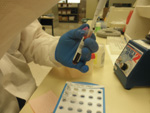|
by K. Adam
Mattox
Laboratory Services
As a medical
laboratory scientist, I feel it is
important to give an overview of
what we do as part of Laboratory
Week, April 22-28.
 Laboratorians provide
a wide array of services. We may
study blood cells to help
diagnosis and treat leukemia,
chromosomes to help diagnosis
genetic disorders, urine to
diagnosis certain sexually
transmitted diseases or bacteria
to see which antibiotic treatment
is best for an infection. Laboratorians provide
a wide array of services. We may
study blood cells to help
diagnosis and treat leukemia,
chromosomes to help diagnosis
genetic disorders, urine to
diagnosis certain sexually
transmitted diseases or bacteria
to see which antibiotic treatment
is best for an infection.
What drives us
to gaze through the microscope,
operate large complex instruments,
handle potentially infections
fluids and prepare specimens and
instruments for the analytical
stage is the satisfaction of
providing accurate results to
health care providers. We know we
help save patients lives.
The laboratory
medicine profession is growing
each year. It is estimated that
13,000 new lab professionals will
be needed in the nation from year
to year. However, current training
programs only provide 5,000
professionals each year.
Laboratory
professionals include
pathologists, medical laboratory
scientists, medical laboratory
technicians, cytotechnologists,
histotechnologists, phelbotomists,
clinical chemists, pathology
assistants, laboratory managers,
laboratory coordinators,
laboratory office staff, and
laboratory clerks. At MUSC, we
also are fortunate to have
residents, fellows, medical
laboratory science students and
histotechnology students.
For information
on laboratory educational programs
at MUSC, contact Susan Barrett at
792-6752 or barretsb@musc.edu.
|



 Laboratorians provide
a wide array of services. We may
study blood cells to help
diagnosis and treat leukemia,
chromosomes to help diagnosis
genetic disorders, urine to
diagnosis certain sexually
transmitted diseases or bacteria
to see which antibiotic treatment
is best for an infection.
Laboratorians provide
a wide array of services. We may
study blood cells to help
diagnosis and treat leukemia,
chromosomes to help diagnosis
genetic disorders, urine to
diagnosis certain sexually
transmitted diseases or bacteria
to see which antibiotic treatment
is best for an infection.